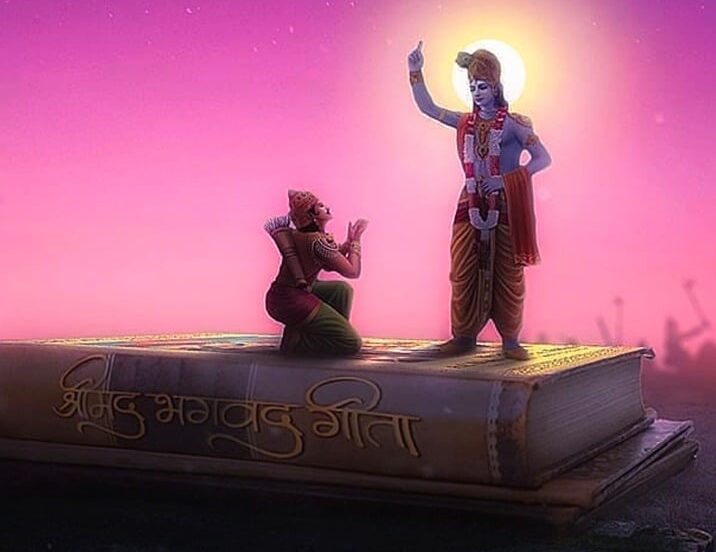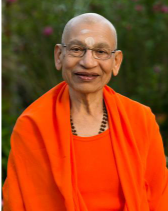
Spirituality:The dialogue between Krishna and Arjuna
By Swami Viditatmananda Saraswati*
The Bhagavad Gita is a dialogue between Lord Krishna and Arjuna that takes place in the middle of a battlefield. Lord Krishna’s teaching to Arjuna addresses every aspect of the human problem of sorrow. The text particularly emphasizes karma-yoga, the right attitude in action, and bhakti, devotion to the Lord, culminating in the knowledge that frees the devotee from sorrow. For this reason, the Bhagavad Gita has vast appeal to a wide range of people and is a very popular text.
In the ninth chapter, Lord Krishna says to Arjuna:
api cetsudurācāro bhajate māmananyabhāk
sādhureva sa mantavyaḥ samyagvyavasito hi saḥ (9.30)
Even if someone of highly improper conduct worships me with one-pointed devotion, he is to be considered a good person because he has resolved rightly. (9.30)
kṣipraṁ bhavati dharmātmā śaśvacchāntiṁ nigacchati
kaunteya pratijānīhi na me bhaktaḥ praṇaśyati (9.31)
Quickly he becomes possessed of a virtuous mind and gains eternal peace. May you know for certain, Kaunteya, that my devotee never gets ruined. (9.31)
Lord Krishna says, “Na me bhaktaḥ praṇaśyati (My devotee does not perish or get ruined).” This simple statement is the subject matter of this book. The statement comprises three aspects: me means “my;” bhaktaḥ means “devotee;” and na praṇaśyati means “does not get ruined.” Me bhaktaḥ na praṇaśyati, my devotee never suffers a loss, never declines, and of course never gets ruined. This is the promise that Lord Krishna gives in the Bhagavad Gita.
To understand this pithy statement, we must understand each of these aspects. We must understand what Lord Krishna means by “my,” for which we must understand what is meant by God. Knowing that we can fully understand what is meant by bhakta, devotee, for which we must also understand what devotion is. Finally, we will understand what is meant by “does not get ruined, does not suffer loss.”
A devotee has reverence for the Lord
Who is a devotee? The devotee is one who has trust, śraddhā, in the Lord, one who has reverence for the Lord, and one who has love or devotion for the Lord. Therefore, a devotee is one who surrenders to the Lord, one who has taken refuge in the Lord. The Lord is the śaraṇya or śaraṇam, the refuge, and the devotee is the one who has taken refuge. The word śaraṇam comes from the root śṝ in the sense of destroying. Śaraṇam means refuge in the sense that when you surrender to it, all your pain and fear get destroyed. Arjuna has displayed all these qualities of reverence and devotion to Lord Krishna. That is why Lord Krishna is his charioteer.
It is not an accident that Lord Krishna is the charioteer of Arjuna; Arjuna consciously made that choice. Both Arjuna and his cousin Duryodhana sought Lord Krishna’s assistance in the impending war, and both approached him while Lord Krishna was sleeping. Arjuna was very humble and stood with folded hands near the feet of the Lord. Duryodhana was very proud and sat near the head of the Lord. Naturally, when Lord Krishna opened his eyes, Arjuna, who was standing near his feet, was the first to be seen. Lord Krishna acknowledged that both sought his help and that he wanted to do justice to both, but he could not join both sides. Having seen Arjuna first, and because he was the younger of the two, Lord Krishna granted Arjuna the first choice between a well-equipped army or Lord Krishna himself, who would not wield a weapon and would not fight the battle.
The choice was between Lord Krishna on one side and the entire army on the other side. Arjuna chose Lord Krishna, which from Duryodhana’s perspective was not a very intelligent choice. Had Duryodhana been given the first choice, he would have immediately chosen the army. Duryodhana thought, “What’s the use of having Lord Krishna if he won’t wield a weapon and won’t fight the battle?” Duryodhana had no use for Lord Krishna. But Arjuna thought, “Whether Lord Krishna wields a weapon or not, I choose him because wherever he is I am sure there is victory.” That shows Arjuna’s trust in the Lord, his devotion to the Lord, and his surrender to the Lord. He is a bhakta, a devotee of the Lord.
Arjuna is a devotee of Lord Krishna
Lord Krishna himself acknowledges that Arjuna is a devotee. In the fourth chapter, he says, “imaṁ vivasvate yogaṁ proktavān aham avyayam, Arjuna, this knowledge that I imparted to you is the knowledge that I imparted to Vivasvān in the beginning of the creation. Vivasvān manave prāha manurikṣvākave’bravīt, Vivasvān passed on the same knowledge to his son Manu, and Manu passed on that knowledge to his son Ikṣvāku. Evaṁ paramparāprāptam imaṁ rājarṣayo viduḥ, this knowledge was preserved by this succession or paramparā of kings who were also ṛṣis, sages or seers. Sa evāyaṁ mayā te’dya yogaḥ proktaḥ purātanaḥ, the same ancient knowledge, Arjuna, I have passed on to you.”
Saying to Arjuna, “I passed on this very same ancient knowledge to you” means that Lord Krishna selected Arjuna both to receive and to impart this knowledge. Śrī Śaṅkarācārya says that knowledge such as this is imparted to someone who is a qualified person: one who has the capacity to grasp this knowledge, the strength to assimilate this knowledge, and the stature to pass on this knowledge. Lord Krishna wants this knowledge to be spread to a vast number of people; therefore, he selected Arjuna as the qualified recipient of this knowledge.
Why was this communicated to Arjuna and not to somebody else? Sometimes people speculate that if Lord Krishna had taught this to Duryodhana, then that battle would not have taken place. That might be true, provided that Duryodhana had been available. But he was not available. He had no faith. In fact, he was very snobbish. He looked down upon Lord Krishna as a cowherd boy, as a magician. He had no reverence for Lord Krishna. Therefore, first of all, he would not have been available to listen to Lord Krishna, and even if Lord Krishna had communicated it to him, he would not have been able to receive it.
This knowledge should be given to one who is the right person. Lord Krishna explains why. He says, “rahasyaṁ hyetad uttamam, I have communicated this most exalted secret to you because; bhakto’si me sakhā ceti, you are my bhakta, my devotee, and you are my sakhā, my friend.” Lord Krishna acknowledged, “not only are you my friend but you are also my devotee.”
Up to this day, Arjuna had always been a devotee, but today he was particularly a devotee. To this Arjuna, Lord Krishna says, “na me bhaktaḥ praṇaśyati, my devotee never gets ruined.” “Bhakta” includes Arjuna.
…to continue
*Swami Viditatmananda Saraswati has been teaching Vedānta Prasthānatrayī and Prakaraṇagranthas for the last 40 years in Ahmedabad, Gujarat. Throughout the year, he conducts daily Vedānta discourses, accompanied by retreats, and Jñāna Yajñas on Vedānta in different cities in India and foreign countries.






